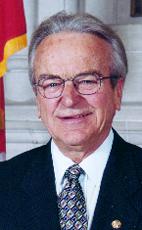Mr. Speaker, there are several models of governing which a society or a community of people could choose in order to determine how it wishes to be governed and how it hopes to achieve its common goals. Of all the models, the democratic model demands the longest period of time for identifying, clarifying, implementing and assessing these goals. Without any doubt, it is the most expensive in terms of time and human energy required for the tasks that are essential for its maintenance and survival. It could also be the most expensive financially. However, there is no other model of governance that is superior to the democratic one, for it is in the democratic process that the very nature of man is recognized and taken into consideration.
Over a lengthy period of time a network of systems has emerged that have attempted to meet the individual's physical, mental, social and spiritual needs. But all of this is taking place in local, national and global environments which are in a constant state of flux, constantly changing.
It is imperative for our society to be in harmony with these fluctuations. It is not always an easy task to identify the changing forces and the long range directions. It is equally difficult to determine the emergent needs of our peoples and
their institutions. A dictator could readily solve these problems according to his own whims or fancies.
However, in a democratic society we must turn to the people for guidance and that is exactly what this government did. With a new leader the Liberal Party of Canada proceeded on an uncharted course, one in which every constituency had the opportunity to provide their perceptions and recommendations through representatives, not only from every facet of our society but from a multitude of other foreign sources. All this resulted in the Liberal plan which our Prime Minister stated "is a plan for Canada, anchored in the principle that governing is about people and that government must be judged by its effectiveness in promoting human dignity, justice, fairness and opportunity".
No doubt the opposing political parties in this House of Commons subscribe to similar principles. However, the big problem is how are these principles to be achieved. As an example the Official Opposition has clearly revealed it must devote all of its energies to the accomplishment of one goal, that being the separation of Quebec from Canada no matter what the cost might be. The third party, the Reform Party, is obsessed with the state of the national deficit and the national debt. It feels it can effectively promote human dignity, justice, fairness and opportunity by slashing federal programs and services in order to eliminate the deficit within three years.
Economists throughout the entire world warn that such a move would wreck the social network and play havoc with our economy, leading to unimaginable social and economic problems. Both opposition parties maintain policy positions of special interest groups and in no way do they reflect the needs of the vast majority of Canadians. The Liberal government is here to serve all Canadians.
The consultative process has never ceased to operate and in fact it intensified as we prepared for the presentation of the first budget. This government received input in a variety of ways from all over Canada. This government read and analysed the written communiques. This government listened to the people. This government acted in a responsible and constructive manner. This government, in light of all the problems with which it had to deal, set out a budgetary plan which has its foundations in people.
As an example I would like to share part of a letter received from several constituents in my riding of Thunder Bay-Atikokan. They state:
Our knowledge of politics and economics is very limited. But we don't think it takes a masters degree to realize that when the taxes go up, consumers don't buy; it is as simple as that. A reduction in taxes will give consumers more money in their pockets and they will be more likely to go out and spend it. Taxing benefit packages will serve to remove more money from the economy and stifle whatever remaining consumer interest there might be.
That is from a letter received from Messrs. Thompson, House, Boyd, Wolotko and Brodie from the city of Thunder Bay. The government heard these concerns and did not raise basic taxes. It did not tax benefit packages.
They also, like millions of their fellow Canadians, expressed their anxieties related to the unemployment-employment situation. These concerns were heard and collectively they determined where the major thrust of the 1994 budget would be: in a host of programs and measures that would enhance the prospects for the creation of jobs and continued economic growth.
I would like to give a few examples of budget initiatives that will have an early impact. First, the rollback of unemployment insurance premiums to the 1993 level of $3 for 1995 and 1996. This represents a saving of $300 million a year for the reinvestment in new jobs. The revival of the residential rehabilitation assistance program will make $50 million a year available for the construction industry. Making the home buyer's plan permanent allows first time home buyers to use RRSP funds to buy homes.
With the reallocation of budgeted existing expenditures, jobs will be created with the national infrastructure program, youth internship and apprenticeship programs. The government intends to renew and revitalize Canada's outdated social security system within two years and to deliver better service to those in need, thus ensuring the social safety net remains affordable.
These are but a few of the many budgetary measures stimulated by the Liberal plan for Canada, as found in "Creating Opportunity," the red book, a plan that promotes human dignity, justice, fairness and opportunity for all Canadians.

